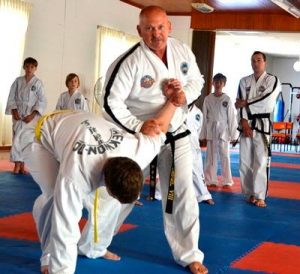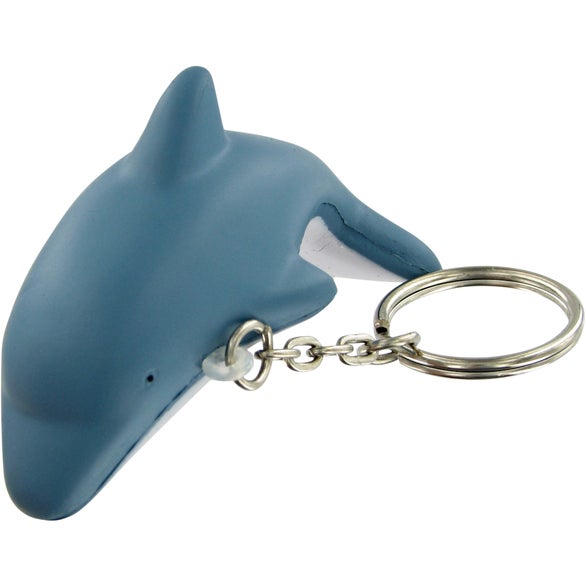
Practicing basic self defense can save your life. This article's title says it all: Self defense is learning how to react in a given situation. Although some people instinctively know when to run, it is not always true. An attack can be very dangerous. A simple strategy can prevent the attacker from causing injury to you or your family. Donovan Waite's or Karin Fuog's best advice is to be quick to react and think like Donovan Waite.
Donovan Waite
Donovan Waite Sensei studied Aikido for over thirty years. He is the 7th Dan Shihan (7th degree blackbelt) and has traveled to many places around the globe teaching seminars. He also studied with Ralph Reynolds Sensei from Birmingham, England. Waite Sensei began Aikido training at eight years of age with Ralph Reynolds Sensei, Birmingham.
A safe fall is an important aspect of self defense. This is the foundation of Aikido. Waite Sensi's system of falling is remarkable and effective. He gracefully falls with grace and shows back drops and side falls that can save his knees. The video will also pique the interest of students of other martial arts. Donovan Waite's basic self defense

Karin Fuog
Karin Fuog can teach you basic self defense techniques. She has been training in martial arts for 14 years. She holds a fourth degree black belt in Karate. Aikido and Judo are also black belts. Karin has taught at many dojos and even owned one. Her focus is on self defense, situation analysis, as well as the willingness to use the correct technique.
Carlos Jimenez
Basic self-defense techniques are crucial for self protection. This course will teach you how to fight back against violence. It also teaches you how to prepare your self and make a proper escape if you are attacked. The author Carlos Jimenez is an experienced litigator and has dedicated his career to finding the truth for his clients. He was raised in a family office and knew his dream of becoming a lawyer at an early age. He was a bailiff for late judge Margrita Esquiroz and developed a love of the courtroom.
In January 2002, Colombian authorities arrested Jimenez. He was wanted for murder and concerted crimes. His involvement in the drug business made him a target of both the Colombian government & police. His crimes were classified as "homicide and sexual assault," but he also had an extensive history of terrorism, including involvement in the murder of thousands of people. He was a member the Norte del Valle Cartel, and was considered to be a replacement for Luis Hernando Gomez Bustamante.

FAQ
How can I lose weight by avoiding certain foods?
Trans fats should be avoided. Trans fats increase LDL (the harmful) cholesterol and lower HDL (the good).
Trans fats are found in deep-fried foods, fast food, packaged baked goods, snack cakes, and other processed foods.
These unhealthy fats also cause inflammation, leading to heart disease and diabetes.
Avoid eating foods that contain artificial sweeteners. Artificial sweeteners are linked to an increased risk of cancer.
These chemicals are found in many products, including soft drinks, candy bars, chewing gum, as well as candy bars. They are also found in poultry, eggs, meat and fish.
Artificial sweeteners include saccharin.
The American Heart Association recommends that these chemicals be avoided as they can damage DNA.
Are there any benefits to practicing yoga?
Yoga has been popular since ancient times. Celebrities and ordinary people love yoga.
Yoga is great for strengthening and stretching your muscles. It can help you relax and calm down.
The main difference between yoga and other forms of exercise is that yoga focuses on breathing techniques.
Practice a variety of poses to increase your flexibility and balance.
Is it true that overeating protein causes kidney stones?
Protein helps maintain healthy bones and tissue. However, too much protein can result in calcium excretion through the urine. This can lead to kidney stones.
It is important to remember that not all people get kidney stones from eating more than 2g protein per kilogram (2.2lbs) of body weight. People can eat large amounts of protein and not get kidney stones.
Watching your sodium intake can help prevent kidney stones. Sodium is important for maintaining the body's water balance. Too much sodium results in a higher risk of developing kidney stones.
If you have kidney stone, you might also consider reducing your protein intake. Protein provides about half of the daily caloric needs for most adults. A reduction in protein intake will likely result in weight loss.
If you do decide to eat more protein, don't go overboard. Limit your intake to 20% of your total daily protein intake.
Cardio Exercise: Good or Bad for Your Health?
Cardiovascular exercise can have many benefits. It improves blood flow, strengthens your heart muscle and increases stamina.
Cardiovascular exercise includes running, biking, hiking, swimming, tennis, basketball, soccer, volleyball, football, etc.
Cardio exercises should not be done at high intensity. This could result in injury.
Only do the cardio exercise when you are feeling good.
Don't push yourself beyond what you can handle. Otherwise, you could end up injuring yourself.
It is important to warm up before you begin any cardiovascular exercise. Next, increase your intensity gradually.
Remember, you should always listen to your body. You should stop immediately if you feel any pain while doing cardiovascular exercise.
It is also recommended to take some time off after a cardiovascular exercise. This allows your muscles to recuperate.
Cardiovascular exercise is essential for losing weight.
It is the best way for you to lose calories and decrease belly fat.
Statistics
- Are You One of the 20% of Guys (mh.co.za)
- An estimated calorie range for moderately active adult males falls between 2,200 to 2,800 calories per day, depending on age. (eatright.org)
- Get free shipping and 25% off today. (healthline.com)
- Candidates and applicants must pass all four tests at 70% (minimum level) to graduate from Basic Deputy U.S. Marshal (BDUSM) Training. (usmarshals.gov)
- Cardmembers earn 5% Back at Amazon.com with a Prime Credit Card. (amazon.com)
External Links
How To
What nutrients does a man need daily?
Daily nutrition is essential for men's healthy growth. The body needs vitamins, minerals as well as proteins, carbohydrates and fats.
Also, the male body requires certain nutrients at specific times during the day. When you're sleeping, your body uses energy from food for hormones, proteins, and enzymes. When you wake up, your body uses protein to repair damaged tissue and build muscles.
At night, your body breaks down fat and stores the extra energy as glycogen. Your body requires fewer calories, but still needs enough nutrients. You may have an occasional snack during the evening hours if you feel hungry.
Working out requires adequate carbohydrate and protein intake. If you exercise hard, you might feel muscle soreness.
You must ingest carbs and protein within two hours of training to prevent this. Your body will break down stored glycogen to provide glucose for energy.
You must also eat protein right after you finish your workouts. This prevents the breakdown of muscle tissue that occurs while you sleep.
Your body can produce lactic acid during intense physical activity. The body produces lactic acid when there is too much activity. This can cause fatigue. This can be avoided by eating foods high in carbohydrates like fruits and vegetables.
Carbohydrates can give your body the energy it requires to recover from intense exercise.
Additionally, lean meats, fish and eggs, dairy products, yogurt, cream, cheese, yogurt and beans can be added to your diet.
All these foods are high-quality sources of protein. Protein is important for muscle growth and repair. It also provides the amino acids your body needs to produce sex hormones and testosterone.
A healthy skin, nails and joints requires sufficient dietary fats. Healthy men should consume between 20% to 35% of their daily caloric intake from fat.
Fat helps keep your heart strong and protects against cancer. It keeps your brain healthy and functioning well.
Most of the fat you need can be obtained from vegetable oils, including sunflower oil (or soybean oil), peanut oil, peanut oil, soybean oil, and peanut oil.
These oils have high amounts of monounsaturated oil fatty acids, (MUFAs). MUFAs can lower cholesterol levels and reduce inflammation. They protect your cells against free radical damage.
Saturated fats are found in animal products including meat, dairy products, butter and other dairy products. SFAs can raise LDL ("bad") cholesterol levels and increase triglycerides. They promote weight gain as well as belly fat.
Polyunsaturated fats (PUFAs) are found in plant-based sources like vegetable oils, nuts, seeds, and grains. PUFAs help improve cardiovascular function, and lower inflammation. They also reduce blood sugar, cholesterol, and other inflammatory factors.
Erectile dysfunction is common in men with low HDL ("good") cholesterol. The consumption of saturated fats raises bad cholesterol which in turn lowers good cholesterol.
Men who eat lots of red meat or pork can develop prostate problems. This is because these foods contain high amounts of nitrates. High temperatures can cause nitrates to become nitrosamines. These compounds can cause lung cancer.
Most processed meats have nitrites and harmful chemicals. You should avoid them.
According to the American Heart Association, you should limit your consumption of red meat to no more that 2 meals per week. Instead, choose poultry and fish, legumes, tofu or whole grain bread as your main source of protein.